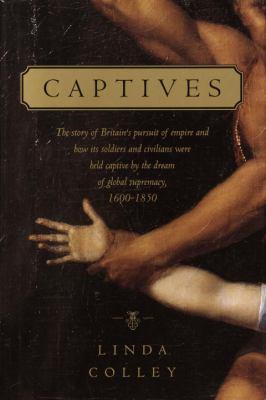
Captives
Available Copies by Location
| Location | |
|---|---|
| Stamford | Available |
Browse Related Items
| Subject |
| Captivity narratives > Great Britain > History. British > Foreign countries > History. Imperialism > History. Great Britain > Colonies > History. |
- ISBN: 0375421521
- Physical Description xvii, 438 pages : illustrations, maps
- Edition 1st American ed.
- Publisher New York : Pantheon Books, [2002]
- Copyright ©2002
Content descriptions
| Bibliography, etc. Note: | Includes bibliographical references (pages 380-424) and index. |
| Immediate Source of Acquisition Note: | LSC 41.95 |
Additional Information

Publishers Weekly Review
Captives
Publishers Weekly
(c) Copyright PWxyz, LLC. All rights reserved
Colley (Britons: Forging the Nation, 1707-1837) brilliantly marshals an array of captivity narratives by everyday Britons captured by foreign powers to show the dizzying ethnic and cultural complexity of empire. She considers four zones of the British Empire-the Mediterranean, North America, India and Afghanistan-between the years 1600 and 1850. For reasons of size, population and geography, Britain couldn't run its empire alone. In India and the Mediterranean, for example, collaboration and accommodation with indigenous groups was the rule; most "British" troops in India were native-born sepoys. And over two and a half centuries, tens of thousands of Britons were taken captive by foreigners. In North America, settlers were seized by Native Americans; sailors were sold into slavery by Barbary (North African) corsairs. Colley describes how these captives handled painful encounters with the "other." To a surprising degree, she shows, captives learned to adapt to, and accommodate, a vastly different cultural milieu. Colley also provides an original account of the Revolutionary War, showing how captivity narratives became part of the propaganda war. In India, most British captives were soldiers taken in battle. These Indian narratives "served to personalize overseas and imperial events" to the larger British public. Colley, who in 2003 will become Shelby M.C. Davis professor of history at Princeton, makes a first-rate argument for her provocative thesis about the complex cross-cultural relations of empire, with lucid prose, exhaustive research and surprising insights from unexpected sources. This is highly recommended for those wishing a more nuanced, inclusive and less monolithic approach to the British empire. 74 illus. Agents, Emma Parry and Michael Carlisle. (Jan. 7) (c) Copyright PWxyz, LLC. All rights reserved

Kirkus Review
Captives
Kirkus Reviews
Copyright (c) Kirkus Reviews, used with permission.
Of empire-building, discovering the Other, and going native: a thoughtful reappraisal of England's centuries-long process of world conquest. English literature offers two great, conflicting parables of that process, writes Colley (History/Princeton Univ.; Britons: Forging the Nation, 1707-1837). The first is Defoe's Robinson Crusoe, whose shipwrecked protagonist "uses force and guile to defeat incomers who are hostile, while firmly organizing those who defer to his authority"; the second is Swift's Gulliver's Travels, whose eponymous hero finds himself captured by unimpressed locals who "sell him like a commodity, turn him into a spectacle, and sexually abuse him." Both parables are useful to keep in mind, Colley writes, in following the fortunes of the British warriors who carved out an overseas empire hundreds of times larger than their homeland and dominated a quarter of the world's people. Many of them fell captive to the nations they set out to overwhelm, and much of England's knowledge of those nations came from their accounts of being ransomed or escaping, through books and broadsides such as Joseph Pitts's True and Faithful Account of the Religion and Manners of the Mohammetans (1704). Colley combs through that library to chart Britons' evolving view of their would-be subjects, and offers some interesting notes along the way; for instance, while discussing representative texts of the "Indian captivity narrative," perhaps the earliest literary genre of European America, she volunteers that Britons' relations with peoples throughout the world were "complex, mutually uncomprehending, but by no means automatically hostile," a far more useful take than the usual good-versus-bad of postcolonial studies. Indeed, Colley writes, the most successful of the empire's soldiers had the wisdom to acquire knowledge of the other, court "indigenous tolerance," and even consent, and otherwise behave in un-Crusoe-like ways as they went about their business--behavior that counted as much as any weapon in coloring so much of the world map scarlet once upon a time. A nuanced complement to the growing library of revisionist histories of empire.

BookList Review
Captives
Booklist
From Booklist, Copyright (c) American Library Association. Used with permission.
As the British empire expanded, so too did the number of British traders, settlers, and soldiers who were taken prisoner. The immensely popular genre of the captivity narrative resulted, which means several things to historian Colley. Most directly, and probably the most relevant to contemporary issues, the narratives describe cultural interaction, from about 1600 to 1850, between white Britons and Islamic corsairs of North Africa, native peoples of North America, and those of Mysore in India. These are the three arenas of encounter in which Colley analyzes the literature, which contains its share of sensationalized horror. More intriguing to the author, however, is what the literature has to say about imperialism as experienced by its nominal beneficiaries, with Colley stressing the privations and early death that were most British emigrants' lot. Her regard for them and their stories as evidentiary equals of any minister's memo bestows an intimate contact with imperial history; and although her book is a scholarly treatment, Colley's populistic source material, plus her offering of six-dozen contemporary images, should entice serious history readers. ^-Gilbert Taylor


